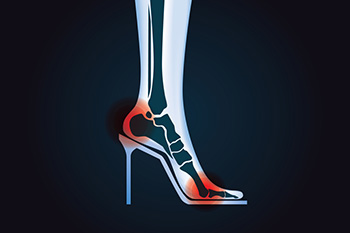
High heels, while fashionable, can contribute to various foot deformities in women. Prolonged wearing of high heels alters the natural alignment of the foot, leading to conditions like bunions, where the big toe is angled inward towards the smaller toes. Hammertoes may develop, causing the toes to bend abnormally due to pressure and restricted space in narrow shoe designs. Additionally, high heels can worsen existing foot conditions, such as plantar fasciitis, contributing to chronic heel pain and inflammation. Achilles tendon shortening and calf muscle tightening are also common, affecting mobility and increasing the risk of injury. To decrease these risks, women can opt for lower-heeled shoes with adequate arch support and a roomy toe box. Regular stretching exercises and alternating heel heights can help maintain foot flexibility and may help reduce the likelihood of developing painful deformities. If you have developed foot pain as a result of wearing high heels, it is suggested that you schedule an appointment with a podiatrist who can offer effective relief remedies and guide you on more suitable shoes to wear.
High heels have a history of causing foot and ankle problems. If you have any concerns about your feet or ankles, contact one of our podiatrists from Fusion Foot and Ankle. Our doctors can provide the care you need to keep you pain-free and on your feet.
Effects of High Heels on the Feet
High heels are popular shoes among women because of their many styles and societal appeal. Despite this, high heels can still cause many health problems if worn too frequently.
Which Parts of My Body Will Be Affected by High Heels?
- Ankle Joints
- Achilles Tendon – May shorten and stiffen with prolonged wear
- Balls of the Feet
- Knees – Heels cause the knees to bend constantly, creating stress on them
- Back – They decrease the spine’s ability to absorb shock, which may lead to back pain. The vertebrae of the lower back may compress.
What Kinds of Foot Problems Can Develop from Wearing High Heels?
- Corns
- Calluses
- Hammertoe
- Bunions
- Morton’s Neuroma
- Plantar Fasciitis
How Can I Still Wear High Heels and Maintain Foot Health?
If you want to wear high heeled shoes, make sure that you are not wearing them every day, as this will help prevent long term physical problems. Try wearing thicker heels as opposed to stilettos to distribute weight more evenly across the feet. Always make sure you are wearing the proper shoes for the right occasion, such as sneakers for exercising. If you walk to work, try carrying your heels with you and changing into them once you arrive at work. Adding inserts to your heels can help cushion your feet and absorb shock. Full foot inserts or metatarsal pads are available.
If you have any questions please feel free to contact our offices located in Fort Worth and Arlington, TX . We offer the newest diagnostic and treatment technologies for all your foot and ankle needs.


